This is a fairly straightforward one. A suffragist is someone who supports the extension of voting rights: whether to working-class men, to women, to Indigenous people, to anyone who is excluded from the voting process. It generally also means by peaceful means, such as petitions and similar campaigns. Here are some suffragists who were ‘early adopters’ of the right of white women to vote in New Zealand, the first country in the world to grant (any) women the right to vote in 1893, and in South Australia, where white women gained the right to vote and (in a world-first) stand for parliament in 1894.

Kate Sheppard, whose campaigning was instrumental in gaining the vote for women in New Zealand
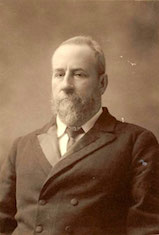
Charles Kingston, the premier of South Australia whose government extended the vote to white women in 1894
Other places were a lot slower to grant women the vote, notably the United Kingdom. Some English suffragists, led by a woman called Emmeline Pankhurst, starting adopting more radical tactics in the 1910s, including arson. They were called suffragettes, which was intended as a belittling insult. But in that intriguing way that the insulted will proudly claim an insulting term and rob it of its power, suffragette came to mean simply the radical wing of British female suffrage supporters, particularly those who belonged to Pankhurst’s organisation, the Women’s Social and Political Union (WSPU). Suffragette has also been used to describe some American activists.
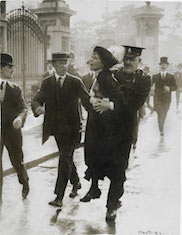
Emmeline Pankhurst being arrested during a demonstration
The suffragettes were not afraid to use force, and force was also used against them, including the force-feeding of jailed suffragettes who engaged in hunger strikes.
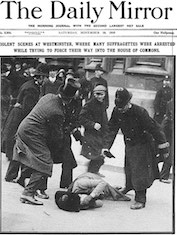
A suffragette is knocked down by police during a protest
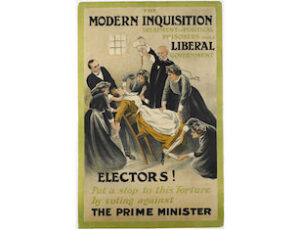
Jailed suffragettes on hunger strikes were feed by tubes forced through their nose
Married women over the age of 30 gained the vote in the United Kingdom in 1918; this was extended to all adult women in 1928.
It may also be possible that the suffragettes invented cat memes.
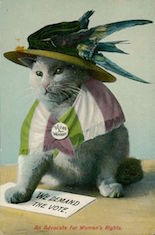
International Women’s Day is 8 March.

If you have found this post interesting, you can find a full index to my other posts on the index page. To be notified when I post a new topic, follow me on Facebook! If you have any particular questions you’d like me to answer in future posts, just send me a message. I’m always interested to learn what people think, and how you came across this site, so please post a comment.
If you think you would be interested in either my complete grammar course or an individual customised online course (particularly suited for people who don’t live in Melbourne), just click your preferred option.